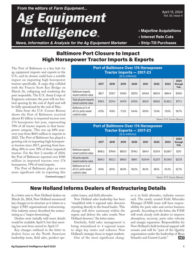With the proliferation of large ag equipment dealer networks springing up in recent years, it's a logical question to ask: what happens if (when?) one of them falls on hard times?
It hasn't happened in the ag equipment business yet, but Case Construction is finding out and, according to published reports, it's in process of rebuilding its dealer network in the southeastern U.S.
A March 9 report from Dow Jones Newswires says Case Construction has been without dealers in Florida, the Carolinas and Georgia since January when Briggs Equipment closed the last of its 19 stores. Briggs is believed to be largest dealership group to fail so far.
At one time, Briggs claimed to be one of the largest Case construction dealers in the U.S. While Briggs's parent company, privately held Sammons Enterprises of Dallas, has not publicly said why it closed its dealerships, the collapse of the housing market and fall off in commercial building is suspected to be the overriding factor.
CNH has assembled a group of investors under Trekker Tractor to operate the locations abandoned by Briggs. The group consists of Silvani Capital, the operator of a hedge fund, along with principals in machinery dealerships in Puerto Rico and Venezuela that handle CNH, Kobelko and New Holland equipment.
CNH, which is owned by Fiat, is ranked as the fourth largest construction equipment manufacturer behind Caterpillar, Komatsu and Deere. To allow its dealers to clear out equipment inventories, CNH has cut back its production to about half of what it was in 2009.
Even more pressing than the question of what happens when a mega dealer gets in trouble may be what happens when the principal/ owner of a huge privately held dealership group wants to retire or just get out of the business?
Agri-Service, one of AGCO's largest dealers with 8 locations in Idaho, Utah and Oregon, may have partially answered that question last month when its owner, Cleve Buttars, turned the company into an ESOP (Employee Stock Ownership Plan). Under such an arrangement, each employee receives the value of stock in the company that is redeemed when he or she retires or leaves the company.




Post a comment
Report Abusive Comment